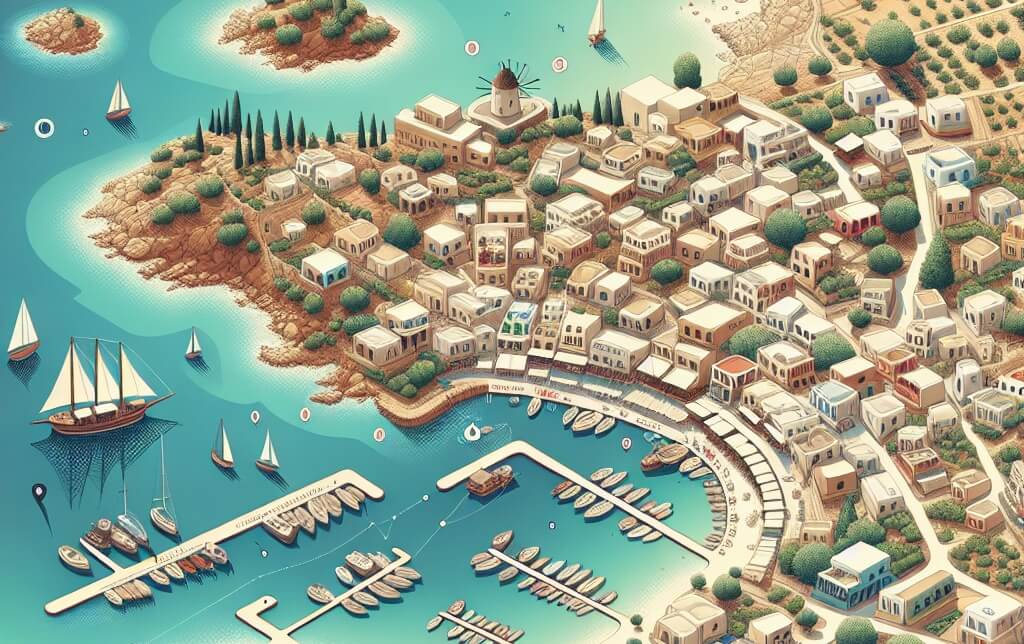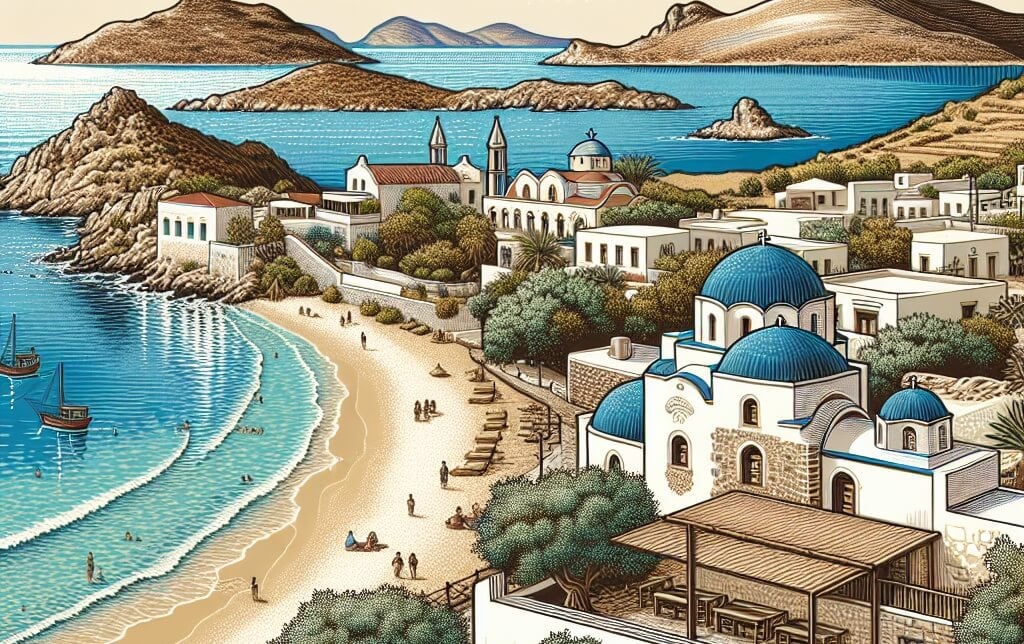
Discover Marathonas Greece: History, Beaches, and More!
Marathonas, Greece, is a destination rich in history, stunning beaches, and diverse attractions waiting to be explored. Steeped in ancient lore and renowned for its pivotal role in the Battle of Marathon, this picturesque town offers a unique blend of past and present. Visitors can immerse themselves in the historical significance of the Marathon Run, a tribute to the legendary run of Pheidippides. Beyond its historical allure, Marathonas boasts pristine beaches along the Aegean Sea, inviting travelers to relax and soak in the Mediterranean sun. The town's charming streets are lined with traditional tavernas, offering authentic Greek cuisine and a warm, welcoming atmosphere. Whether delving into the past at the Archaeological Museum of Marathon or basking in the beauty of its sun-kissed shores, Marathonas promises an unforgettable experience for those seeking a blend of history, culture, and natural beauty.
I. Introduction
Marathonas, Greece, renowned for its historical significance as the site of the Battle of Marathon in 490 BC, holds a prominent place in the annals of ancient Greek history. This small town, located in the Attica region, attracts visitors from around the world who come to pay homage to the brave soldiers who fought in the decisive battle against the Persian Empire. The legacy of Marathon extends beyond its historical roots, as it is also known for hosting the authentic "Marathon Race," a 26.2-mile endurance event that has become synonymous with perseverance and athletic achievement. In this introduction, we will delve into the rich history and cultural significance of Marathonas, shedding light on its enduring appeal and the enduring spirit of determination that defines this iconic destination.
II. Battle of Marathon
The Battle of Marathon, a significant event in ancient Greek history, took place in 490 BC near the town of Marathon in Greece. It was a pivotal conflict between the Greek city-states, led by Athens, and the invading Persian Empire. The Greeks, despite being outnumbered, achieved a remarkable victory due to their strategic planning and superior fighting skills. The battle marked a turning point in the Greco-Persian Wars and demonstrated the resilience and determination of the Greek forces. The victory at Marathon is celebrated as a symbol of Greek unity and patriotism, showcasing the importance of courage and military prowess in defending one's homeland.
III. Ancient Greece
Ancient Greece, particularly during the time of the Battle of Marathon in 490 BC, was a pivotal period in history marked by significant cultural, political, and military developments. The Battle of Marathon, located in the region of Marathonas, Greece, was a decisive conflict between the Athenians and the Persian Empire. This battle not only showcased the military prowess and strategic acumen of the Athenians but also solidified the concept of democratic governance in Greek society. The victory at Marathon was a testament to the resilience and unity of the Greek city-states against external threats. It laid the foundation for the subsequent rise of Athens as a dominant power in the region and left a lasting legacy in the annals of ancient history.
IV. Marathon Running
Marathon running, originating from the ancient Greek city of Marathonas, holds a significant historical and cultural importance. The modern marathon distance of 26.2 miles is inspired by the legendary run of Pheidippides, who ran from Marathonas to Athens to deliver news of the Greek victory over the Persians in 490 BC. Today, marathon running continues to captivate athletes and spectators alike, symbolizing endurance, determination, and the triumph of the human spirit. Participants train rigorously for months to prepare for the physical and mental challenges of completing a marathon, often pushing themselves to their limits in pursuit of personal achievement. The marathon race remains a revered test of athleticism and perseverance, drawing individuals from all walks of life to partake in this ultimate test of endurance.
V. The Site of the Battle
The site of the Battle of Marathon holds immense historical significance in the context of Marathonas, Greece. This pivotal battle took place in 490 BC between the Athenians and the Persian Empire, resulting in a decisive victory for the Athenians. The battlefield itself, located in the plains of Marathon, is now a revered site that commemorates the bravery and strategic prowess of the Athenian soldiers. Visiting the site offers a profound opportunity to reflect on the valor and sacrifice of those who fought in defense of their homeland. The Battle of Marathon stands as a testament to the enduring spirit of freedom and democracy, making it an essential destination for those seeking to connect with ancient history and the foundations of Western civilization.
VI. Marathon Lake
Marathon Lake, located in Marathonas, Greece, holds historical significance as it is situated near the site of the famous Battle of Marathon in 490 BC. This battle, where the Athenians defeated the Persians, is a pivotal event in ancient Greek history. The lake itself is a tranquil and picturesque spot, offering visitors a peaceful retreat surrounded by natural beauty. It serves as a reminder of the bravery and sacrifice of those who fought in the battle, making it a place of reverence and reflection. Additionally, Marathon Lake provides opportunities for outdoor activities such as walking, hiking, and birdwatching, further enhancing its appeal to both locals and tourists seeking a peaceful escape in the midst of historical significance.
VII. Ancient Marathon
VII. Ancient Marathon refers to the historical event known as the Battle of Marathon that took place in 490 BC near the town of Marathon in Greece. This significant battle marked a pivotal moment in the Greco-Persian Wars, where the outnumbered Athenian army achieved a remarkable victory over the invading Persian forces. The distance between Marathon and Athens, approximately 26.2 miles, is where the modern-day marathon race derives its name. The legacy of the Battle of Marathon has endured through the centuries, symbolizing the triumph of the underdog and the spirit of endurance and determination.
VIII. Greek "Μαραθώνας"
The Greek town of Marathonas holds significant historical and cultural importance as the site of the famous Battle of Marathon in 490 BC. This pivotal event marked a decisive victory for the Athenians against the invading Persian forces, showcasing the valor and strategic prowess of the Greek army. The legacy of the Battle of Marathon has endured through the centuries, with the modern-day marathon race drawing inspiration from the legendary run of the soldier Pheidippides, who reportedly ran from Marathon to Athens to deliver news of the victory before collapsing from exhaustion. The name "Marathon" has thus become synonymous with endurance, perseverance, and the indomitable spirit of the human will.
IX. Water Supply
In Marathonas, Greece, the water supply plays a crucial role in ensuring the well-being and sustainability of the community. The availability of clean and reliable water is essential for various aspects of daily life, including drinking, sanitation, and agriculture. The local authorities in Marathonas must prioritize the maintenance and management of the water supply infrastructure to meet the needs of the growing population and to safeguard against potential water shortages or contamination. Additionally, sustainable water management practices should be implemented to preserve the natural resources and ensure the long-term resilience of the water supply system in Marathonas.
X. Marathon Beach
Marathon Beach, located in Marathonas, Greece, is a picturesque stretch of coastline known for its natural beauty and historical significance. The beach is named after the Battle of Marathon, a pivotal event in ancient Greek history where the Athenians defeated the Persians in 490 BC. Today, Marathon Beach is a popular destination for both tourists and locals seeking relaxation and recreation. With its crystal-clear waters, golden sands, and stunning views of the Aegean Sea, Marathon Beach offers a serene escape from the hustle and bustle of city life. Visitors can enjoy sunbathing, swimming, and water sports, as well as explore nearby archaeological sites such as the Tomb of the Athenians and the Marathon Museum. Overall, Marathon Beach is a must-visit destination for those looking to immerse themselves in both natural beauty and rich history.
XI. Town of Marathonas Greece
The town of Marathonas, Greece, holds significant historical and cultural importance due to its association with the ancient Battle of Marathon. This battle, fought in 490 BC, marked a crucial moment in Greek history as the outnumbered Athenian army successfully defeated the Persian invaders. The town's name itself is derived from this historic event, as it is believed to be the place where a messenger ran from Marathon to Athens to announce the victory, inspiring the modern-day marathon race. Today, Marathonas is a picturesque coastal town that attracts visitors with its beautiful beaches, archaeological sites, and traditional Greek charm. The town serves as a reminder of Greece's rich heritage and the enduring legacy of the heroic deeds of its past.









